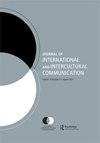次等人的声音和后殖民精神分裂症:m.i.a.卡拉的政治紧张
IF 1.4
Q2 COMMUNICATION
Journal of International and Intercultural Communication
Pub Date : 2020-03-13
DOI:10.1080/17513057.2020.1735487
引用次数: 3
摘要
在“反恐战争”期间,英国/斯里兰卡嘻哈艺术家M.I.A.被禁止进入美国,她在2007年的专辑《Kala》在全球南方的多个地方录制,整理了本土音乐风格和非正统的录音技术。通过批判/文化分析,本文探讨M.I.A关于卡拉的作品是由“差异运动”动员起来的下层抵抗,特别是在其生产模式中,它在旨在消除或中和政治颠覆性艺术和艺术家的制度机制之外运作,并与之相对立。然而,M.I.A的音乐采样也暴露了创作自由与文化挪用之间的冲突,象征着“后殖民主义/后现代精神分裂症”(Vályi, 2011)。文化融合:Bartók与Kodály在原住民文化权利时代。见K. McLeod & R. Kuenzli(编),《跨媒体切割:挪用艺术、干涉主义拼贴和版权法》(第219-236页)。达勒姆,北卡罗来纳州:杜克大学出版社)。本文章由计算机程序翻译,如有差异,请以英文原文为准。
Subaltern voices and postcolonial schizophrenia: The political tensions of M.I.A.’s Kala
ABSTRACT Banned from the U.S. during the “war on terror,” the British/Sri Lankan hip-hop artist M.I.A. responded by recording her 2007 album Kala in multiple locations throughout the global South, collating indigenous musical styles and unorthodox recording techniques. Via a critical/cultural analysis, this paper explores M.I.A.’s work on Kala as subaltern resistance mobilized by “differential movement,” particularly in its mode of production, which operated outside of, and in opposition to, institutional mechanisms designed to expunge or neutralize politically subversive art and artists. Yet M.I.A.’s musical sampling also surfaces conflicts between creative freedom and cultural appropriation, emblematizing “postcolonialist/postmodern schizophrenia” (Vályi, 2011. Remixing cultures: Bartók and Kodály in the age of indigenous cultural rights. In K. McLeod & R. Kuenzli (Eds.), Cutting across media: Appropriation art, interventionist collage, and copyright law (pp. 219–236). Durham, NC: Duke University Press.).
求助全文
通过发布文献求助,成功后即可免费获取论文全文。
去求助
来源期刊

Journal of International and Intercultural Communication
COMMUNICATION-
CiteScore
3.80
自引率
12.50%
发文量
19
 求助内容:
求助内容: 应助结果提醒方式:
应助结果提醒方式:


